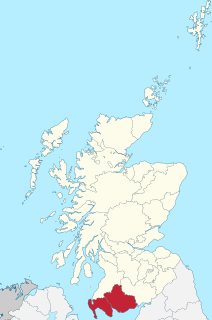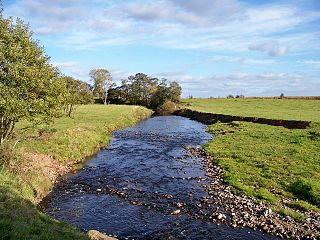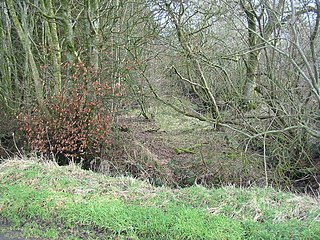
Alexander III was King of Scots from 1249 until his death. He concluded the Treaty of Perth, by which Scotland acquired sovereignty over the Western Isles and the Isle of Man. His heir, Margaret, Maid of Norway, died before she could be crowned.

Jacobitism was a largely 17th- and 18th-century movement that supported the restoration of the senior line of the House of Stuart to the British throne. The name is derived from Jacobus, the Latin version of James.

Scotland is a country that is part of the United Kingdom. Covering the northern third of the island of Great Britain, mainland Scotland has a 96-mile (154-kilometre) border with England to the southeast and is otherwise surrounded by the Atlantic Ocean to the north and west, the North Sea to the northeast and the Irish Sea to the south. It also contains more than 790 islands, principally in the archipelagos of the Hebrides and the Northern Isles. Most of the population, including the capital Edinburgh, is concentrated in the Central Belt—the plain between the Scottish Highlands and the Southern Uplands—in the Scottish Lowlands.

The monarchy of the United Kingdom, commonly referred to as the British monarchy, is the constitutional form of government by which a hereditary sovereign reigns as the head of state of the United Kingdom, the Crown Dependencies and the British Overseas Territories. The current monarch is Queen Elizabeth II, who ascended the throne in 1952.

The United Kingdom has four legal systems, each of which derives from a particular geographical area for a variety of historical reasons: English and Welsh law, Scots law, Northern Ireland law, and, since 2007, purely Welsh law. Overarching these systems is the law of the United Kingdom, also known as United Kingdom law. UK law arises from laws applying to the United Kingdom and/or its citizens as a whole, most obviously constitutional law, but also other areas - for instance, tax law.

English law, also known as English and Welsh law or English Common law, is the common law legal system of England and Wales, comprising mainly criminal law and civil law, each branch having its own courts and procedures.

The Scottish Borders is one of 32 council areas of Scotland. It borders the City of Edinburgh, Dumfries and Galloway, East Lothian, Midlothian, South Lanarkshire, West Lothian and, to the south-west, south and east, the English counties of Cumbria and Northumberland. The administrative centre of the area is Newtown St Boswells.

Galloway is a region in southwestern Scotland comprising the historic counties of Wigtownshire and Kirkcudbrightshire. It is administered as part of the council area of Dumfries and Galloway.

The Kingdom of England was a sovereign state on the island of Great Britain from 12 July 927, when it emerged from various Anglo-Saxon kingdoms, until 1 May 1707, when it united with Scotland to form the Kingdom of Great Britain. The Kingdom of England was among the most powerful states in Europe during the medieval period.
Early modern Britain is the history of the island of Great Britain roughly corresponding to the 16th, 17th and 18th centuries. Major historical events in early modern British history include numerous wars, especially with France, along with the English Renaissance, the English Reformation and Scottish Reformation, the English Civil War, the Restoration of Charles II, the Glorious Revolution, the Treaty of Union, the Scottish Enlightenment and the formation and the collapse of the First British Empire.

The Debatable Lands, also known as debatable ground, batable ground or threip lands, lay between Scotland and England. It was formerly in question as to which it belonged, when they were distinct kingdoms. The name either signifies litigious or disputable ground, or it comes from the Old English word 'battable'.

The River Sark or Sark Water is a river best known for forming part of the western border between Scotland and England. Most of its short length, however, is entirely in Scotland. It flows into the estuary of the River Esk just to the south of Gretna.
Candia Frances Juliet McWilliam is a Scottish author. Her father was the architectural writer and academic Colin McWilliam.
The Sannyasi rebellion or Fakir rebellion were the activities of sannyasis and fakirs in Bengal, India in the late 18th century which took place around Murshidabad and Baikunthapur forests of Jalpaiguri under the leadership of Majnoo Shah Fakir and Pandit Bhabani Charan Pathak. Historians have not only debated what events constitute the rebellion, but have also varied on the significance of the rebellion in Indian history. While some refer to it as an early war for India's independence from foreign rule, since the right to collect tax had been given to the British East India Company after the Battle of Buxar in 1764, others categorize it as acts of violent banditry following the depopulation of the province in the Bengal famine of 1770.

The Anglo-Scottish border is a border separating Scotland and England which runs for 96 miles (154 km) between Marshall Meadows Bay on the east coast and the Solway Firth in the west. The surrounding area is sometimes referred to as "the Borderlands".
The Battle of Hadden Rig was a battle fought about three miles east of Kelso, in the Scottish Borders, between Scotland and England on 24 August 1542, during the reigns of King James V of Scotland and Henry VIII of England. The English army was led by Robert Bowes, Deputy Warden of the English East March. It was a significant Scottish victory, but it was overshadowed by the disastrous Scottish defeat at the Battle of Solway Moss in November.

The Scots' Dike or dyke is a three and a half mile / 5.25 km long linear earthwork, constructed by the English and the Scots in the year 1552 to mark the division of the Debatable lands and thereby settle the exact boundary between the Kingdom of Scotland and the Kingdom of England.

Great Britain is an island in the North Atlantic Ocean off the northwest coast of continental Europe. With an area of 209,331 km2 (80,823 sq mi), it is the largest of the British Isles, the largest European island and the ninth-largest island in the world. It is dominated by a maritime climate with narrow temperature differences between seasons. The 60% smaller island of Ireland is to the west—together with these islands, along with over 1,000 smaller surrounding islands and named substantial rocks, form the British Isles archipelago.
Alex Massie is a Scottish freelance journalist commentator based in Edinburgh. He is Scotland editor for The Spectator, and writes a political column for The Times and The Sunday Times. He is also a regular contributor to ITV Border, BBC Television and BBC Radio.
Convertible husbandry, also known as alternate husbandry or up-and-down husbandry, is a method of farming whereby strips of arable farmland were temporarily converted into grass pasture, known as leys. These remained under grass for up to 10 years before being ploughed under again, while some eventually became permanent pasturage. It was a process used during the 16th century through the 19th century by "which a higher proportion of land was used to support increasing numbers of livestock in many parts of England." Its adoption was an important component of the British Agricultural Revolution.














